Crypto Company CEO Flees Iran After $20m Embezzlement

Sina Estavi, the CEO of a cryptocurrency exchange company, has escaped Iran despite a travel ban imposed on him for $20m embezzlement.

Sina Estavi, the CEO of a cryptocurrency exchange company, has escaped Iran despite a travel ban imposed on him for $20m embezzlement.
The confirmation of Estavi's escape surfaced when a video emerged, showing him in France. Mizan, the Judiciary News Agency, unequivocally stated that Estavi had left Iran “in violation of legal prohibitions.” Estavi is under an Interpol red notice for his arrest and extradition.
Earlier this month, the Tehran Revolutionary Court's Branch Five sentenced him to 15 years in prison, 75 lashes, fines, asset forfeiture, and governmental service deprivation.
Fars News Agency, associated with the Revolutionary Guards, reported that “Estavi's cooperation in addressing claims from 24,000 shareholders resulted in his release under strict supervision, coupled with the imposition of bail.”
Estavi's extensive list of charges includes forgery of official documents, selling non-existent property, and purchasing antique items.
Tajarat News recently revealed Estavi's embezzlement exceeding $20 million, further emphasizing the bleak prospects for victims seeking to recover their losses following his escape.
In April 2021, IRNA state news agency reported that Estavi had acquired the ownership rights to the first tweet in history from Jack Dorsey, the founder of Twitter, for a sum of $2.9 million.
Estavi, who was arrested in May 2021 on charges of “disrupting the economic system and breaching trust”, was accused of unlawfully withdrawing funds from more than 51,000 Cryptoland users.
Iran's Judiciary disclosed that Cryptoland's operations were unauthorized, highlighting the illicit nature of the cryptocurrency exchange.

The United States intercepted and shot down an Iranian-produced drone near the Bab el-Mandeb Strait in the southern Red Sea on Wednesday.
The US Central Command (CENTCOM) announced in a post on Xthat the unmanned aerial vehicle was shot down by the USS Carney, an Arleigh Burke-class guided missile destroyer, at 11:00 (Sanaa time) on November 29.
CENTCOM identified the drone as an Iranian-produced KAS-04 and said it was launched from Houthi-controlled areas of Yemen.
“Although its intentions are not known, the UAV was heading toward the warship,” added the report.
According to CENTCOM, at the time of the incident, “the USS Carney was escorting the USNS SUPPLY (Oiler) and another US flagged and crewed ship carrying military equipment to the region.”
The vessels and their crews sustained no damage or injury, the report said.
The incident came a week after the USS Thomas Hudner, another American warship deployed in the region, shot down several one-way attack drones launched by Iran-backed Yemeni Houthis.
Since Hamas’s deadly onslaught on Israel on October 7, Yemen’s Houthis, backed by the Iranian regime, have launched several drone and missile attacks against US and Israeli targets in the region.
Earlier in the month, the Israeli Defense Forces (IDF) also shot down a cruise missile over the Red Sea before it could infiltrate into the Israeli territory.
The missile, which targeted Israel’s southernmost city of Eilat, was believed to have been launched by Yemen’s Houthis, The Times of Israel reported.
Though the Islamic Republic has avoided any direct involvement in the Israel-Hamas conflict, the regime has used its proxy groups in the region such as Houthis and Hezbollah to attack Israel and American targets.
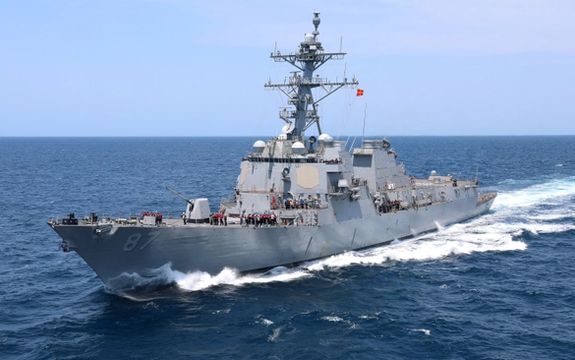
Attacks on US forces in the Middle East resumed Wednesday, after several days of relative calm which coincided with the ceasefire between Israel and Hamas.
A US defense official told Iran International that American troops in Syria were targeted Wednesday morning, only a day after the Pentagon press secretary spoke of a lull in hostile activities since 23 November.
Also on Wednesday, an Iranian-made drone launched from Yemen was shot down by USS Carney destroyer near the Bab el-Mandeb Strait.
“Although its intentions are not known, the UAV was heading toward the warship,” read the statement from the US Central Command (CENTCOM). “The USS Carney was escorting the USNS SUPPLY (Oiler) and another U.S. flagged and crewed ship carrying military equipment to the region. There were no injuries to U.S. personnel and no damage to U.S. vessels.”
Since mid-October, US forces in Iraq and Syria have come under attack 74 times. It is widely believed that all have been carried out by Iran proxies. The regime officials, however, deny involvement while praising the “courage” of those they call ‘axis of resistance’ –from Iraq to Syria to Yemen and southern Lebanon.
Iran’s ambassador to the UN claimed Tuesday that his country has “never had a hand in actions or attacks against US military forces in Syria or elsewhere.”
Iran having provided financial and military support to Hamas for two decades, has preferred not get directly involved in the Gaza war, but its proxy forces conduct attacks for what they say is US support for Israel.
Biden critics say his Iran policy has emboldened the regime and its proxies, who see little downside to their adventurism. Although the US military has launched several retaliatory attacks in Syria and Iraq, but Iran's Revolutionary Guard who control the proxy forces have not been targeted. In addition, while these attacks take place, the Biden administration has allowed Iraq to release billion of dollars of frozen Iranian funds.
On Tuesday, an IRGC-affiliated news agency published a video of the aircraft carrier USS Dwight D. Eisenhower being monitored with drones while passing through the Strait of Hormuz.
“Multiple hails and warnings were ignored by Iran,” according to a CENTCOM statement condemning the incident. “This unsafe, unprofessional, and irresponsible behavior by Iran risks US and partner nation lives and needs to cease immediately.”
The Biden administration has repeatedly stated that it reserves the right to defend American troops and that it would do so with whatever means necessary. But many on the Capitol question the will and the judgment of the administration when it comes to dealing with Iran and its proxies.
“Biden unfroze $6 billion in Iranian funds. Weeks later, Hamas terrorists attacked Israel,” Congressman Russell Fry posted on X Wednesday. “Iran knowingly funds Hamas. Actions have consequences. We must pass the No Funds for Iranian Terrorism Act, which would refreeze these funds and limit Iran's ability to fund terrorism."
A former IRGC officer Ezzatollah Zarghami recently admitted on Iranian state TV that the regime was responsible for supplying rockets to Hamas and Hezbollah.
Zarghami, currently Iran’s minister for Cultural Heritage, said: “I traveled to the region as the production manager of those rockets... I spent some time underground (inside tunnels). I held training sessions for them: on the usage of the rockets, their features. And they were successful classes.”
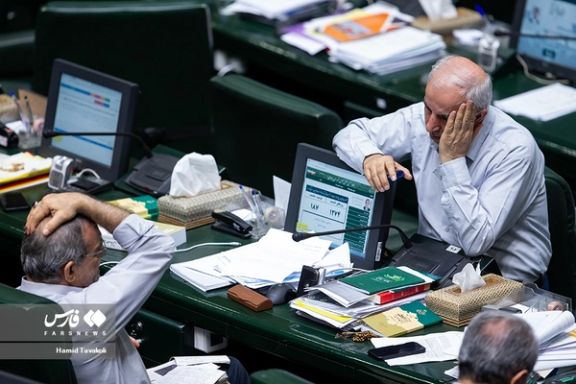
As young radicals are set to dominate Iran's upcoming parliamentary elections, media and politicians express concern about the future of governance in the country.
Khabar Online website, which is close to moderate conservatives such as former Majles Speaker Ali Larijani, describes the situation as one in which "Young radicals gallop ahead while the wise elderly are silent."
The website added that the conservative camp is left with no fair, popular and moderate politicians after some of its heavyweights died during the past years, and some others have been side-lined by loud young radicals with little if any political experience. Elder conservatives have been silenced or have chosen silence to avoid attacks by radicals.
The report also highlighted that key politicians in all factions failed to train younger successors who would replace them at one point, and this is a danger for the future of governance in Iran.
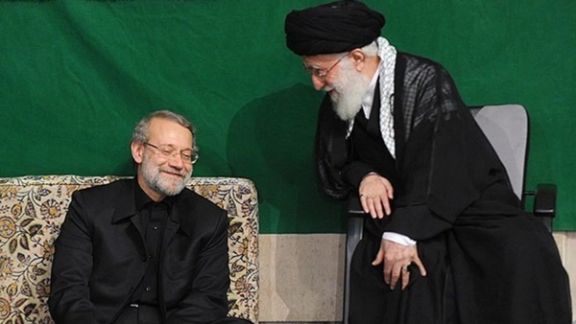
Meanwhile, Iranian media quoted a report originally produced by IRGC-linked Tasnim News Agency about who are likely to be the conservatives leaders and candidates in the upcoming parliamentary elections. The names in the Tasnim report and their poor track record in management makes the threat mentioned by Khabar Online look even more serious.
According to Tasnim, incumbent Majles Speaker Mohammad Bagher Ghalibaf, Tehran Mayor Alireza Zakani and the ultraconservative Paydari Party will have their separate list of candidates for the next Majles. Ghalibaf leads his group of neo-cons, Zakani is the leader of his own Rahpouyan [followers of Khomeini and Khamenei] party and fundamentalist Paydari will list some of its current lawmakers as well as new names from among young radicals.
In fact, according to conservative commentator Mohammad Mohajeri in an interview with Fararu website, Paydari is so radical that it might even go its separate way and leave President Ebrahim Raisi alone at least for the upcoming election. Meanwhile, Mohajeri accused Paydari Party of planning to restrict the entire government to radical members of the party.
Ghalibaf has recently given a name to his group of neo cons: The Association for Awakening Revolutionary Forces. The group's first gathering was also attended by vice President Mohsen Rezaei and former Majles Speaker Haddad Adel. During the meeting, Ghalibaf said that in spite of all the talk about unity, there is nothing wrong with competition among various conservative groups.
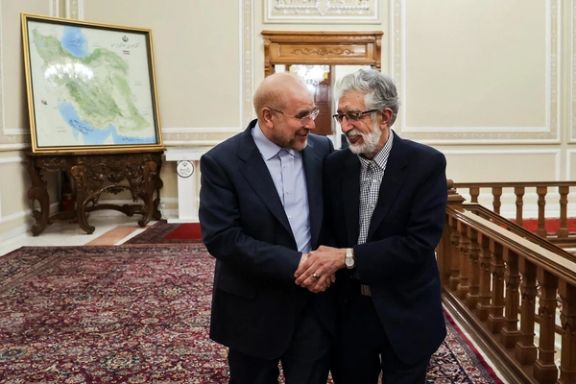
Zakani held his group's gathering about three weeks later with a smaller number of politicians present. He also rebranded his group with a new name: Tahavol Khahan which is another synonym for the Persian term Eslah Talaban (Reformists). However, this does not change the conservative and opportunist nature of the group gathered around the mayor mainly to benefit from the Tehran Municipality's vast resources.
According to Tasnim, the traditional conservatives who believe in the wisdom of their elder members, are also active in the elections under the name of Shora-ye Vahdat (The Council for Unity). That is a unity Iran's conservatives have been talking about for over 45 years. However, it never materialized thanks to rivalries and interests that divided the entire conservative camp. One of the leading faces of this group is former Foreign Minister Manouchehr Mottaki who was fired by former President Mahmoud Ahmadinejad in the middle of a meeting in Africa.
Paydari is pursuing its election agenda under the umbrella of the party and also as the re-branded political group SHARIAN, a Persian acronym for the Strategic Council of Friends of the Islamic Revolution. The group operates under Minister Mehrdad Bazrpash.
Interestingly, none of these individuals and their team members are known for any outstanding achievement, as Supreme Leader Ali Khamenei’s office continues to run and micromanage all the affairs of the state.

Iran's Interior Minister Ahmad Vahidi has defended the practice of government agents photographing citizens in public spaces, describing it as "natural."
As a response to public outcry, Vahidi compared traffic control cameras, asserting that capturing images of those violating rules is a common and convenient method.
In April, Iran's police announced that new cameras were installed in public places and thoroughfares to identify and penalise unveiled women, another attempt to rein in the increasing number of women defying Iran's compulsory dress code.
Tehran’s prosecutor opened a case against the reformist Etemad newspaper on Sunday after it published an interior ministry document outlining the enforcement of hijab rules. The report provided details about the deployment of hijab enforcers at Tehran's subway stations and cited a directive issued by Vahidi to several government entities, including Tehran Municipality and the Metro Company.
The document, outlining steps for enforcing hijab rules in "government-controlled places," contradicted Vahidi's earlier denial of his ministry's involvement in the deployment of hijab enforcers at subway stations.
A state official responsible for promoting religious social standards, Mohammad-Hossein Taheri-Akerdi, said on Saturday that over 2,850 "revolutionary and jihadi forces" are voluntarily carrying out the religious duty of enforcing hijab.
Vahidi's directive, as disclosed in the document, grants authority to the police, the intelligence organization of the Revolutionary Guards (SAS), and the Ministry of Intelligence to photograph and film women defying hijab rules in public places, including subway stations and metro cars. The collected evidence will be used for prosecution and intimidation, aiming to enforce compliance with hijab regulations.
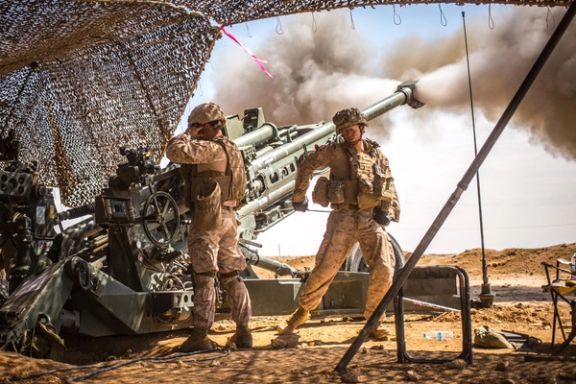
A US defense official told Iran International that a rocket attack targeted American troops at Mission Support Site Euphrates in Syria on Wednesday morning.
The official added that the attack left "no injuries or damages to infrastructure," noting that "This brings the total number of attacks (since mid-October) to 74 (36 in Iraq and 38 in Syria).”
Attacks on US troops in the region have intensified since Israel began its retaliatory offensive on Gaza in response to the Hamas attack of 7 October, which killed 1,200. Iran-backed militant groups in Iraq and Syria have claimed responsibility for the attacks, but Tehran denies any role, claiming that they are acting independently. However, the Islamic Republic calls these militant groups part of its axis of resistance against the United States and Israel. Almost every armed group that has targeted US forces in recent weeks is backed by or affiliated with the regime in Iran.
The American defense official added that he cannot speculate on future attacks, emphasizing that “Our forces in Iraq and Syria will stay focused on the mission we have at hand, which is preventing Daesh resurgence and advising, assisting and enabling our partner forces.”
The United States has 2,500 troops in Iraq, and 900 more in neighboring Syria, on a mission to advise and assist local forces in combating Islamic State, which in 2014 seized swathes of territory in both countries.
The official reiterated that US and Coalition forces “reserve the inherent right to self-defense.”
While Iran-backed groups have regularly attacked American bases in Iraq and Syria, injuring dozens, the Houthis in Yemen have seized a container ship and frequently launched missiles, including a ballistic missile last weekend that aimed at a US warship in the Gulf of Aden. The US has issued a warning to commercial shipping in the Indian Ocean.